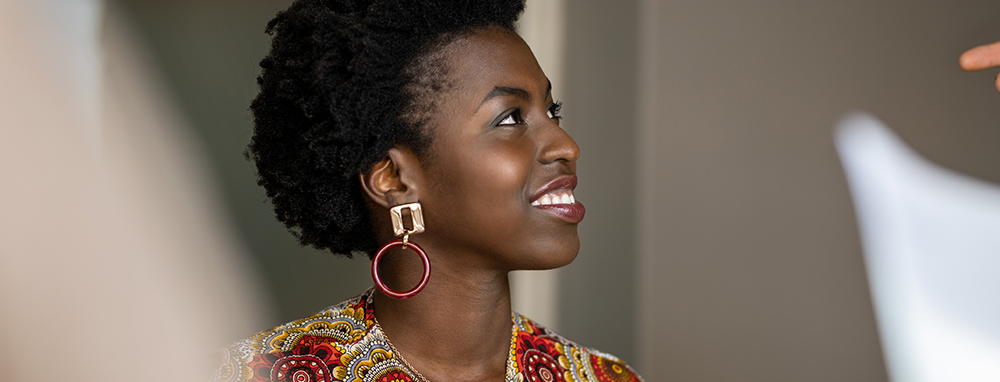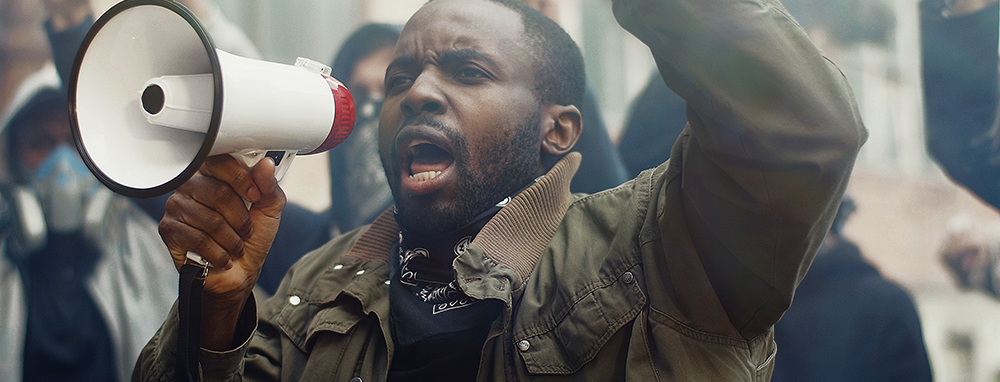In October, we marked Black History Month UK by highlighting some of our Black students, alumni and partners and the positive contributions they are making to organisations around the world.
As a part of the month-long events focused on creating sustainable and viable change for Black professionals, we hosted London Business School’s inaugural Black at LBS series.

The first event in the series, Black at LBS: Exploring the Stats and Recognising the Gaps, discussed the reasons why Black professionals still faced barriers to entry throughout their career and what they think are the necessary changes needed to overcome adversity. Amber Haque (Senior Recruitment & Admissions Manager) and Tabria Lenard (MBA Graduate 2021 & Co-Founder of the Black in Business Club at LBS) explored some of the most striking statistics by leading a conversation with current students and alumni.
Joining Amber and Tabria were Ayo Gabriel (MBA2018 Executive Director, Private Wealth Management, Goldman Sachs), Zipporah Gatiti (EMBA2014 Founder & CEO, Taste of Kenya), Claude Fidelin (EMBAG2012 Head of Digital Commerce for Jordan Brand EMEA, Nike) and Anneke Gustafson (MiM2022 Marketing Coordinator, thirteen lune).
The discussion aimed to foster an open dialogue on race and work and also bring to life some very important emerging statistics. Perhaps one of the most striking statistics addressed was that according to the US Bureau of Labor statistics 4.1% of US chief executives and 7.8% of people in management occupations identified as Black and in addition, currently in 2021 there are zero Black executives leading UK companies.

Zipporah Gatiti confirmed that she was not surprised by the statistic. She argued that it’s usually very hard to advance in corporate companies at senior levels because of either a lack of support, lack of network, or lack of mentors. She chose to leave the corporate world after 10 years and set up her own start-up where she was able to craft the leadership positions that she wanted. She feels confident that with work, the statistic can be changed.
On the other hand, Ayo Gabriel finds the statistic triggering. He isn’t shocked but he is disappointed. During the discussion, he spoke about his upbringing in South East London, which he likened to sometimes being like a mini Lagos within London where the majority of his school and church friends were Black or of some ethnic diversity. When he entered the corporate world, it quickly became apparent that he was one of three salespeople out of a workforce of two to 300, which sparked an immediate psychological association with the running theme of ‘being the only Black person in the room’.
“Whenever you are the only Black person, you have a heightened consciousness of this fact. In a perfect case scenario, you will be in an environment that is highly inclusive so everyone appreciates you being different, where there is no difference to your ability to do the job. As a society, I don’t think we are there yet.“
When looking at the stats more practically, Claude Fidelin explained his shock when hearing the following fact for the first time – there are more CEOs in the UK called Peter than there are Black CEOs and similarly in the US there are more CEOs called John than there are Black CEOs.
Claude has been working in the corporate world for over 20 years across Europe, the Middle East and the US and has had both negative and positive experiences. This is one of the reasons why he started his blog where he explores the impact of being Black within a corporate setting.
Claude asks “When looking at a CEO as an individual who is part of a corporation; and if we agree that Black people regardless of their sexuality, orientation and a range of other contributing factors, have the same capabilities as everyone else, then why are Black people not present at these higher levels? Is it time for corporate companies to look inwardly as to why this underrepresentation of Black employees continues to be an issue?”
Anneke Gustafson is a current Masters in Management student. As someone who will enter the corporate world as a fresh graduate within the next year she is concerned about the barriers to entry, especially around mentorship and the unfortunate lack of senior Black role models.
“It’s disheartening looking at the workforce that I’m trying to enter and to not see anyone that looks like me and not have anyone to compare the difficulties of my journey with.”
During the session, panelists made reference to the importance of having a ‘blueprint’. If we believe that representation matters and the research clearly states that representation is important, then what motivates and inspires Black professionals to achieve given the absence of role models?

Ayo explained that motivation has many different drivers. If you want to see change and you are motivated to see this change, then you will continue to stay motivated. For example, if you take the various civil rights movements, the leaders of these movements were so incredibly motivated because they wanted to see a change in the world.
“My mother to this day is the most motivated human that I know. My upbringing was an interesting experience and I saw first-hand that through motivation you can achieve things that the world says you can’t. Being Black in today’s society is hard and being a woman in isolation is also hard. If you intersect the two, imagine how hard it is as a Black woman with your own additional unique hurdles. I saw her overcome so much. If you push hard enough, you can achieve what you set your mind to.”
Ayo went on to explain that upon graduating from his MBA, the potential career paths that existed had a very specific demographic which for the most part seemed to be for the most elite with very few opportunities for Black professionals. It became a goal-driven motivation for him to try to fill this gap.
“When thinking about becoming a blueprint for other people, I hope other people can follow in my footsteps and achieve more than I have. This for me is a big enough incentive for me to keep doing what I do.”
In Zipporah’s experience of being the first Black woman producing and exporting coffee in Kenya, she explains that it is very important for people to see Black people, specifically Black women in sectors or leading sectors that are historically male-dominated.
“It was important for me to let girls and boys in Kenya see that it’s possible to enter into this sector. I also think it’s important for Black people to be represented in other sectors that they often don’t consider because of this lack of representation. This will allow us to trail blaze, thus creating our own blueprint. And only then will we begin to see change.”
It became clear from the discussion that looking for role models outside of your specific industry is a common occurrence for the panelists and equally for Black professionals in white-dominated environments. Anneke states that she has gotten a lot of inspiration from looking at people outside of her specific career path. She referenced Elaine Welteroth‘s bestselling book, More Than Enough, which states ‘It’s so heavy a burden to be the first and the only in a field but it’s also such an immense privilege to be there and to set the course for someone else following in that path’. Anneke takes great comfort from the idea that by moving forward within whatever sector she chooses, she is helping someone else move forward in their own.

There has been lots of talk recently in business, the press, and in publications about bringing your whole self to work. Being authentic in who you are in the workplace, yet there are still plenty of Black professionals who feel that they can’t be themselves in a professional environment. And that they must either sensor or hide a part of who they are. The panel was asked whether they have adopted a work persona to better appeal to their White colleagues and whether they thought this either impedes or advances their career.
Anneke says that she makes an effort to try not to code-switch in whatever environment that she is in. She argues that there is definitely a lot of pressure, especially coming up through the education system, to be considered or seen as a palatable Black person and to adhere to a very specific form of what the business culture expects you to be. One example she gave was the expectation for Black women to change their hair.
“I used to straighten my hair and I used to wear braids. I made a very conscious decision when starting Business School that I was going to wear my hair natural all the time. I think it is important to bring my most authentic self to whatever space that I am in so that others feel they can do the same.”
On the other hand, Ayo says that he has been on an entire journey when it comes to code-switching. After landing his first job in the corporate world, he saw it as the most unsocio-economically demographic place that he had ever seen. Although he considers himself British, he also states that it is very important to acknowledge his identity as a British-Nigerian, as it is its own identity in its own right, with its own mannerisms and cultural norms.
“On starting at that company, I thought, wow, I’m different, but that’s fine. I’ll get my head down, work hard and everything should go to plan. However, I realised quickly that I might have been missing out on opportunities as I wasn’t at drinks or social functions because I didn’t initially feel entirely comfortable. Once I realised this, I thought let me jump all the way in and try to fit in with the majority.”
Ayo added that as his journey continued, he started to receive promotions and pay rises but he considered the process of trying to be someone else ineffective despite his success. He understood that he could still be his own person, stand for his values and his culture, but in a way that he could adapt to his work environment rather than change to fit the majority. Ayo likens this approach to that of an equalizer, which takes a song, changes its general sound, for example from hard rock to a more acoustic sound, but the song in itself stays the same.
“So in the office and in life now, I can equalize who I am. My song stays the same, my personality stays the same, my values stay the same and my cultural norms stay the same. I don’t have a persona amongst friends or family or work, I am the same person, I just have a different equalizer setting for the environment that I’m in.”
But how does this expectation change the further you are into your career? Claude raised the point that as you get more senior you are always mindful of bringing your authentic self to work. And often Black professionals have to make a decision based on the negative and positive impact of being an authentic Black person in the corporate world. Claude argues that if it negatively impacts you, you have to decide whether it is really the right company culture or organistation for you.
“Attending an elite university in Paris, I felt that I was always trying to play catch up and be accepted, but I never truly felt that I fitted in. Once I began my career, I made the decision to stop trying to fit in. I started to share my journey and my experiences and my career started to take off in ways that were unimaginable. It’s much easier to take this kind of risk much earlier on in your career when you’re less concerned about paying rent or finding another job. I find it sad that people may go their whole working lives without being able to be themselves and show their full potential.”

In May 2020, the murder of African American George Floyd by White police officer, Derek Chauvin in Minneapolis, Minnesota sparked widespread rage around the world. The panel was asked their feelings about why it took this kind of event, for businesses, organisations, and institutions of higher education to pay serious attention to racism, diversity, equity, and inclusion. No longer could the real underrepresentation of Black employees be skewed by wider BAME figures and companies were under mounting pressure to address and prioritise the recruitment of Black leaders in their boardrooms.
Anneke, who worked for thirteen lune, a beauty company set up by only ‘Black and brown founders’, says her organisation was founded following the murder of George Floyd when there was a real calling for companies to respond to the stats of its Black employees.
“It revealed how many Black people were leading companies, how many were responsible for driving sales, how many had a say in the marketing materials, how many were involved in leading the development and production for skincare for Black people. I must say the beauty industry is changing, but in my honest opinion, it took a pandemic for people to really pay attention. People had a lot of time on their hands. Businesses are working hard to incorporate Diversity & Inclusion into their business models and employer engagement strategies, but the bigger question to ask is how long will this last and will Black people feel engaged enough to participate. This is something that we are yet to understand.”
Tabria asked if 2020 was a turning point and whether real change is taking place. She also questioned what businesses can do better.
Ayo states that it is encouraging. Although up until now progress has been slow, he acknowledges the acceleration over the last 18 months. Speaking on his firm in particular, he says that there have been honest conversations from senior levels down to lower ranks.
“It was only in 1965 that the Race Relations Act was first introduced to protect Black people from racism, which wasn’t that long ago. We are very early in the journey of trying to unwind years and years of societal injustice – Fifty years in, it’s going to take time and firmer stances to ensure that Black people are fully represented.”
Zipporah reflects on the need for systemic change. In order for changes to happen, the system needs to change. And this is the reason why you have very few Black people in leadership positions and tragic events such as the George Floyd murder have been allowed to happen. Diversity & Inclusion initiatives are a good thing, but they are a Band-Aid solution because the system is broken and we are not taking the time to understand how to fix it.
“In order to deal with systematic change, we need to have every stakeholder at the table and on the same page. If an organisation genuinely wants to be more diverse, then every single person in that company should be responsible for looking at exactly what is broken and the reasons why they do not have enough initiatives in place for encouraging more hiring of Black professionals.”
Although the conversation so far has been largely aimed at underrepresentation within corporate environments, Zipporah speaks about being an entrepreneur and the similarities she faces.
“Surprisingly, the same situations or issues that you see occurring in the corporate world are happening in the entrepreneurship world. The statistics for funding that goes to people of colour is stark. And funding for people of colour, who are women, is even worse. And funding, for people of colour, who are women and of African descent, it is minute. I was advised that in order to get access to better funding I should have more male representation on my board. The reality is, it’s all about biases. People like to hire people who look like them and similarly people like to fund people who look like them.”
Throughout the conversation, there were many different aspects brought to the table. From exploring statistics to asking whether Black people can really bring their authentic selves to the workplace and still be successful. Tabria goes on to discuss the unspoken conversation about a ‘double-burden’ that Black professionals face. She details the normal pressures to be successful within your role, to be a successful role model to others behind you, and all while being active in Diversity & Inclusion conversations to try to make a difference.

In many companies, as a Black person, sharing your experience is becoming the new normal. To have a voice and for your voice to be amplified is something many have fought for a long time. Ayo is an advocate for speaking about the Black experience. He admits that he’s happy to share his experiences with anyone who will listen, but he thinks it is unfair that Black people should always be expected to share their journey, especially with strangers.
“It doesn’t account for who you are as a human. Because you’re Black and there has been an injustice, you now have the floor and no choice but to tell your story. There is a lot of psychological unwrapping that needs to happen with being Black. And to do so publicly is a very tough thing to do. When that choice gets taken away is when it goes too far.
Even using the word ‘Black’. For the first time, I’ve had colleagues refer to me as a Black person. This tells me we’re making progress. We now have a platform where we can be more comfortable discussing race. But we cannot keep speaking about it if there’s no action that follows.”
Claude adds Black people, should ask themselves what is their intent and strategy when sharing their stories.
“If you feel like your story is going to make a difference, then go for it, but not if it feels like an opportunity to give a bunch of people a nice story at their next dinner party to say that they’ve suddenly learned something new. We all have a limit of how much time we have in a typical day and even though we are passionate about the cause, we should also be mindful of when it’s time to step away. I understand it’s difficult when the topic is so personal.”
Anneke is a London Business School Black in Business Scholar. Tabria asked whether she feels pressured by the role of being a Black scholar “Sometimes as a Black scholar, there is a little bit of a burden, purely because I’m asked to give so much of myself. From a US context, we do speak very frankly about issues, but I feel like I have to give a bit of myself and a bit of my trauma of what it is to be African American, each time I talk about my experiences. I do sometimes have to weigh up how much of myself, I’m giving up for other people because it is hard to talk about the trial and tribulations of my life on a daily basis.

Zipporah agrees that dialogue is important to inform and educate people, but the goal should always be to get Allies.
“It’s very hard for people who are affected to have to be the ones trying to champion change. It can be very traumatizing. A lot of my former colleagues don’t understand the pressures of being a Black person applying for jobs or going through different career trajectories or even just the biases that you face on a daily basis, so it’s important for me to educate people with the hope they become Allies so that they can advocate on your behalf.”
To conclude Ayo agrees that Allies are indeed important. “In order to genuinely change this Zero Black CEO statistic and even the low % of senior managers (7.8%) we need Allies who are on board. Allies are the incumbent part of this change. As there are currently no Black leaders, at some point when an Ally steps down, he/she should ensure that all measures are taken to consider a pool of talent including diverse candidates before a replacement is decided.”
